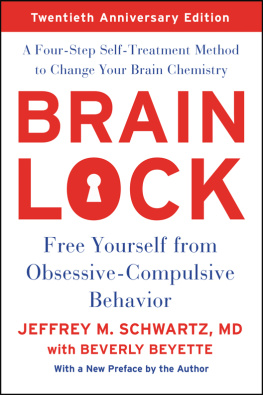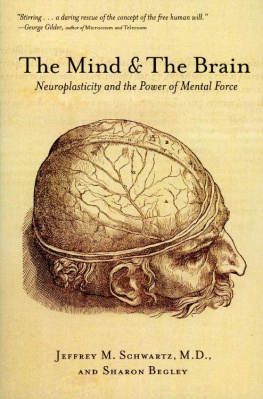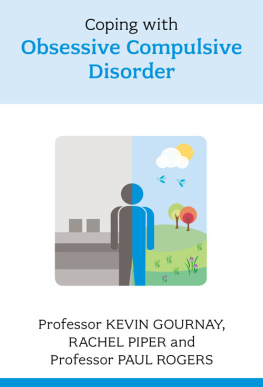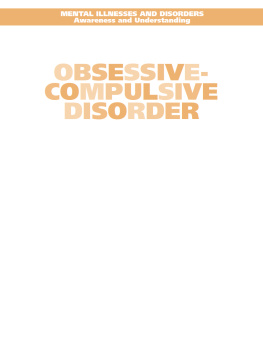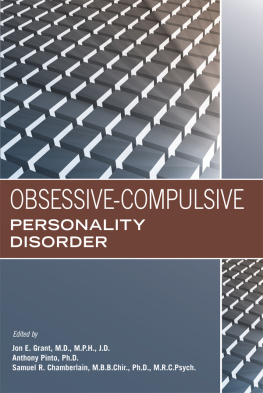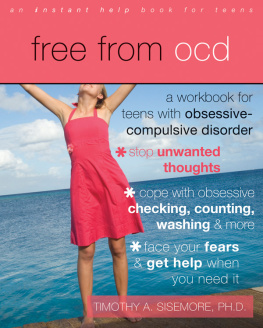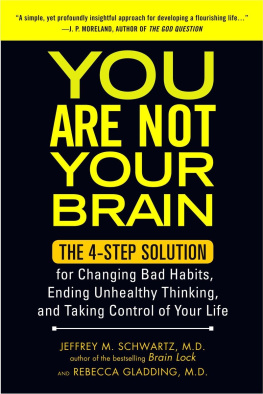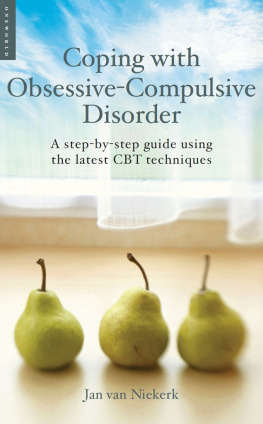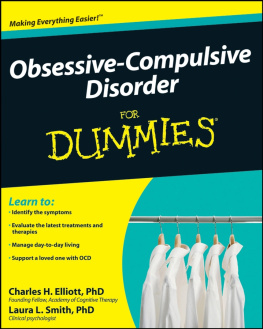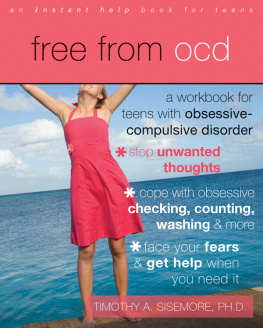Jeffrey M. Schwartz - Brain Lock: Free Yourself From Obsessive-Compulsive Behavior
Here you can read online Jeffrey M. Schwartz - Brain Lock: Free Yourself From Obsessive-Compulsive Behavior full text of the book (entire story) in english for free. Download pdf and epub, get meaning, cover and reviews about this ebook. year: 1997, publisher: HarperCollins, genre: Romance novel. Description of the work, (preface) as well as reviews are available. Best literature library LitArk.com created for fans of good reading and offers a wide selection of genres:
Romance novel
Science fiction
Adventure
Detective
Science
History
Home and family
Prose
Art
Politics
Computer
Non-fiction
Religion
Business
Children
Humor
Choose a favorite category and find really read worthwhile books. Enjoy immersion in the world of imagination, feel the emotions of the characters or learn something new for yourself, make an fascinating discovery.

- Book:Brain Lock: Free Yourself From Obsessive-Compulsive Behavior
- Author:
- Publisher:HarperCollins
- Genre:
- Year:1997
- Rating:5 / 5
- Favourites:Add to favourites
- Your mark:
- 100
- 1
- 2
- 3
- 4
- 5
Brain Lock: Free Yourself From Obsessive-Compulsive Behavior: summary, description and annotation
We offer to read an annotation, description, summary or preface (depends on what the author of the book "Brain Lock: Free Yourself From Obsessive-Compulsive Behavior" wrote himself). If you haven't found the necessary information about the book — write in the comments, we will try to find it.
Brain Lock: Free Yourself From Obsessive-Compulsive Behavior — read online for free the complete book (whole text) full work
Below is the text of the book, divided by pages. System saving the place of the last page read, allows you to conveniently read the book "Brain Lock: Free Yourself From Obsessive-Compulsive Behavior" online for free, without having to search again every time where you left off. Put a bookmark, and you can go to the page where you finished reading at any time.
Font size:
Interval:
Bookmark:
BRAIN LOCK
Free Yourself from Obsessive-Compulsive Behavior
A Four-Step Self-Treatment Method to Change Your Brain Chemistry
Jeffrey M. Schwartz, M.D.
with Beverly Beyette
This book is dedicated to the memory of my grandfather
H ARRY W EINSTEIN
and to the memory of
V EN . M AH  SI S AYADAW
SI S AYADAW
for his monumental contribution to the practice of mindful awareness in this century
Contents
Obsessions, Compulsions, and the Four-Step Self-Treatment Method
The Four Steps
Step 1: Relabel
Its Not MeIts My OCD
Step 2: Reattribute
Unlocking Your Brain
Step 3: Refocus
Wishing Wont Make It So
Step 4: Revalue
Lessons Learned from OCD
Applying the Four Steps to Your Life
The Four Steps and Personal Freedom
OCD as a Family Disorder
The Four Steps and Other Disorders
Overeating, Substance Abuse, Pathological Gambling, Compulsive Sexual Behavior
The Four Steps and Traditional Approaches to Behavior Therapy
OCD and Medication
University of Hamburg Obsession-Compulsion Inventory Screening Form
An OCD Patients Diary of Four-Step Self-Treatment
Self-Treatment Manual for the Four-Step Method
The names and some of the external circumstances of the patients in this book have been changed to protect their confidentiality. All of the symptoms and therapeutic efforts are as they actually occurred.
Note: Part III of this book is a Self-Treatment Manual which contains a practical summary of the Four-Step Method. It can be read independently from the rest of the book, and can be referred to at any time for concrete guidance. There is also a video overview of the Four Steps at http://ocduk.org/video/FourSteps/index/htm .
This book could not have been created without the efforts of the many patients who helped me learn the Four-Step Method. Without the generous support of the Charles and Lelah Hilton family, the scientific work on which this book is based could not have been done. Jessica Klein and Steve Wasserman encouraged me to write this book and introduced me to my publisher, Judith Regan, who has recognized from the first the potential implications of the work described here. Christine Juska helped prepare early drafts. Julie Sherman earned special thanks for her contributions. Will Weston was very helpful with artwork, A. Lorre with photography.
The OCD Research Group at UCLA Medical Center created an excellent environment for doing these studies. Beverly Beyette made a tremendous effort to help the book be as good and useful to as many people as we could make it. Iver Hand was generous with his time and input. Jan Jablonsky, Marty Wax, and Dave Richmond, among others, made helpful comments. Pam and Roy Norman provided much-needed moral support during the hectic final stage of preparation. James Q. Wilson and Don Jefferys encouraged me to pursue some of the broader potential applications of this method.
All in all, you need a lot of help to write a book about self-treatment. Thanks to all the people who provided it.
Howard Hughes was dining with actress Jane Greer at Ciros on the Sunset Strip in Los Angeles one evening in 1947. At one point in the meal, he excused himself to go to the rest room. To Greers amazement, he did not return for an hour and a half. When he finally reappeared, she was astonished to see that he was soaking wet from head to toe.
What on earth happened to you? she asked. Well, Hughes said, I spilled some catsup on my shirt and pants and had to wash them out in the sink. He then let them dry for a while, hanging them over one of the toilet stalls. Once he put his clothes back on, he explained, I couldnt leave the bathroom because I couldnt touch the door handle. I had to wait for someone to come in.
According to Peter H. Brown, coauthor with Pat Broeske of Howard Hughes: The Untold Story , Jane Greer never went out with Hughes again.
Howard Hughes was eccentric, certainly, but he was not a freak. He was suffering from obsessive-compulsive disorder (OCD), a classic and severe case. By the end of his life, in 1976, he was overwhelmed by the disease. He spent his last days in isolation in his top-floor suite at the Princess Hotel in Acapulco, where he had sealed himself in a hospital-like atmosphere, terrified of germs. Blackout curtains at every window kept all sunlight out; the sun, he thought, might transmit the germs he so dreaded. Aides with facial tissues covering their hands brought him food, which had to be precisely cut and measured.
Rumors abounded that he was this reclusive because of drug abuse, a syphilitic condition, or terminal dementia. Actually, all his strange behaviors are readily understandable as symptoms of a severe case of OCD.
Sadly, there was no treatment for OCD in Howard Hughess lifetime. It would be another decade before the disease would be identified as a brain-related disorder.
I frequently cite the case of Howard Hughes to help my patients understand that this disease, OCD, is an insatiable monster. The more you give in, the hungrier it gets. Even Hughes, with all his millionsand a retinue of servants to perform the bizarre rituals his OCD told him to performcould not buy his way out. Eventually, the false messages coming from his brain overwhelmed him.
If you are one of many who suffer from OCD, whether it is a mild case or one as severe as Howard Hughess, this book will show you how to fight and beat it. OCD is a tenacious enemy, but a strong-willed, motivated person can overcome it.
Along the way, you will also learn a good deal about your brain and how you can control it better. You will read the stories of courageous people who, by applying the Four-Step Method, learned how to overcome the dreaded feelings of Brain Lock that are caused by OCD. This method, which has been scientifically demonstrated to enable people to change their own brain function, will be described in such a way that you can readily apply it yourself.
Obsessions, Compulsions, and the Four-Step Self-Treatment Method
We all have our little quirkshabits and behaviorsthat we know wed be better off without. We all wish we had more self-control. But when thoughts spin out of control, becoming so intense and intrusive that they take over against our will, when habits turn into all-consuming rituals that are performed to rid us of overwhelming feelings of fear and dread, something more serious is happening.
THIS IS OBSESSIVE-COMPULSIVE DISORDER (OCD)
The victims of OCD engage in bizarre and self-destructive behaviors to avert some imagined catastrophe. But there is no realistic connection between the behaviors and the catastrophes they so fear. For example, they may shower forty times a day to ensure that there will not be a death in the family. Or they may go to great lengths to avoid certain numbers so as to prevent a fatal airplane crash. Unlike compulsive shoppers or compulsive gamblers, people with OCD derive no pleasure from performing their rituals. They find them extremely painful.
Almost certainly, OCD is related to a biochemical imbalance in the brain that we now know can be treated very effectively without drugs. We know, too, that the Four-Step Self-Treatment Method you will learn in this book enables people with OCD to change their own brain chemistry. Furthermore, this method can be applied effectively to take control over a wide variety of less serious, but troublesome and annoying, compulsive habits and behaviors. (If you think you may have OCD, the University of Hamburg Obsession-Compulsion Inventory Screening Form on Chapter 10 may help you find out. If you dont, the techniques you learn in this book may help you overcome other troubling and annoying habits and behaviors.)
Simply defined, OCD is a lifelong disorder identified by two general groups of symptoms: obsessions and compulsions. Once thought of as a curious and rare disease, it, in fact, affects one person in forty in the general population, or more than five million Americans. A disorder that typically has its onset in adolescence or early adulthood, OCD is more common than asthma or diabetes. It is a devastating disease that often creates chaos in the lives of its victimsand those who love them. The preoccupation with repetitive behaviors, such as washing, cleaning, counting, or checking, causes trouble on the job and leads to marital strife and difficulty with social interaction. Family members may become impatient and angry, demanding, Why dont you just stop! Or they may aid and abet the performance of the silly rituals to buy an hours peace (a very bad idea).
Next pageFont size:
Interval:
Bookmark:
Similar books «Brain Lock: Free Yourself From Obsessive-Compulsive Behavior»
Look at similar books to Brain Lock: Free Yourself From Obsessive-Compulsive Behavior. We have selected literature similar in name and meaning in the hope of providing readers with more options to find new, interesting, not yet read works.
Discussion, reviews of the book Brain Lock: Free Yourself From Obsessive-Compulsive Behavior and just readers' own opinions. Leave your comments, write what you think about the work, its meaning or the main characters. Specify what exactly you liked and what you didn't like, and why you think so.

